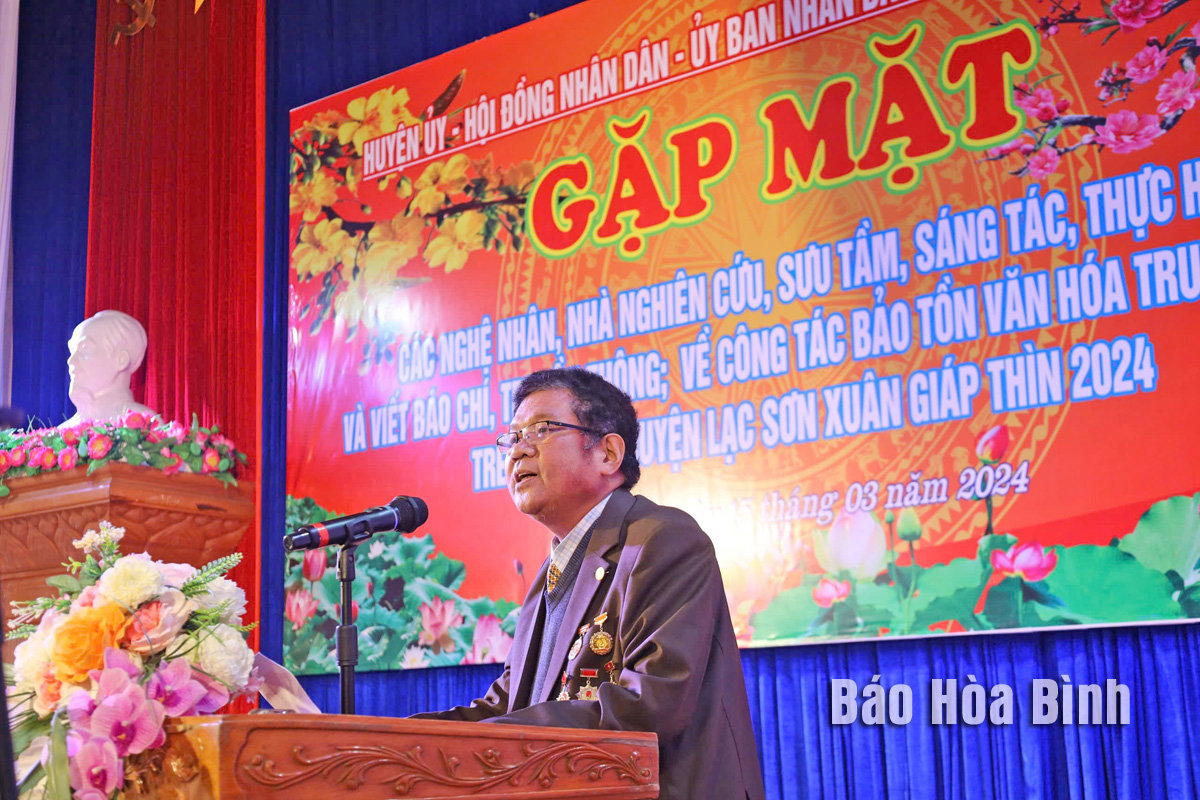
Having applied himself to researching and preserving traditional culture, Meritorious Artisan Bui Huy Vong in Huong Nhuong commune, Lac Son district, has won high regard from many people for his dedication to the Muong ethnic culture.
Meritorious Artisan Bui Huy Vong shares his journey to
research and preserve the Muong ethnic group’s culture.
Vong said researching and preserving the Muong
culture and bringing into play the good cultural values of ancestors in the
modern life is an arduous journey. However, thanks to support from district and
grassroots authorities as well as local artisans, he has obtained certain
achievements.
In particular, he has helped with the
restoration of some traditional festivals such as those of the Khenh Communal
House in Van Son commune, the Bang Communal House in Ngoc Son commune, and the
Khoi Communal House in An Nghia commune. He has written and published nearly 20
books, about 10 scientific articles on specialised magazines, along with
hundreds of articles, short stories, and research papers on central and local
media agencies.
Recalling difficulties and endeavours in the
restoration of local temples and festivals, Vong noted it took almost 10 years,
from 2001 to 2010, to rehabilitate the main hall of the Bang Communal House,
but it was not until 2016 that the Chay Dat - Chay Muong ritual of this site’s
festival was revived. Besides, it took up to 15 years, from 2003 to 2018, to
have the main hall and festival of the Khenh Communal House restored.
As the core zone of the Muong culture, Lac Son
district has also paid attention to revitalising the Muong ethnic singing. As a
result, the folk singing movement has become popular in the local community
over the last 10 years. Five clubs of "thuong rang” and "bo meng”, two types of
the Muong folk singing, have come into being, drawing more than 200 artisans.
Not only an artisan, collector, and researcher,
Vong is also one of the first person to post video clips about the Muong
singing on YouTube, attracting millions of viewers.
However, he is still concerned that many
valuable cultural heritages like the Vanh village stone shelter, the Trai
hamlet cave, Mo Muong, Muong gongs, as well as the customs and folk songs of
Muong people remain untapped. District authorities have just restored traditional
festivals and utilised the ethnic group’s space and cuisine for tourism
development.
Vong expressed his hope that the local Party
Committee and People's administration will hold regular meetings with artisans,
collectors, researchers, and those preserving the traditional culture. They
should create a space at major events and folk festivals for Muong singing
artisans in Lac Son, as well as those from across Hoa Binh province and other
localities, to engage in exchanges. In addition, it is important to pay more
heed to tourism promotion to bring into play the role of the local community
and artisans of the Muong culture.
Hoa Binh province has carried out multiple programmes and initiatives to revive its cultural heritage which has gradually fallen into oblivion through the ebbs and flows of history.
The most prominent and defining feature in the prehistoric era of Hoa Binh is the Hoa Binh Culture. The Culture was first discovered in Hoa Binh. The significant prehistoric culture represents not only Vietnam but also Southeast Asia and southern China. Through excavations of cave sites in the limestone regions of Hoa Binh, French archaeologist M. Colani introduced the world to a "Stone Age in Hoa Binh province – Northern Vietnam" in 1927. On January 30, 1932, the First Congress of Far Eastern Prehistorians, held in Hanoi, officially recognised the Hoa Binh Culture.
Known as the "Land of Epic History”, Hoa Binh province, the gateway to Vietnam’s northwest, boasts a strategic location and a unique cultural tapestry woven by its ethnic minority communities.
The People's Committee of Luong Son District recently held a ceremony to receive the certificate recognizing Sau Communal House in Thanh Cao Commune as a provincial-level historical and cultural site.
Recognising the importance of cultural heritage preservation in protecting and promoting the value system of Vietnamese culture, and serving socio-economic development in the new period, Party committees and local administrations in Hoa Binh province have identified it as a key task in the cultural development strategy. The province has been making efforts in mobilising resources, creating consensus among people and engaging ethnic communities in preserving and promoting cultural identity.
Hoa Binh province has captured growing attention both domestically and internationally for its distinctive cultural heritage and rich history. Most notably, it has been renowned for its famous Hoa Binh culture, considered the cradle of ancient Vietnamese civilisation. Looking ahead to significant milestones in 2025 and the 140th anniversary of province establishment in 2026, Hoa Binh Newspaper presents a comprehensive overview of the province's development across economic, social, cultural, tourism, and security domains.



